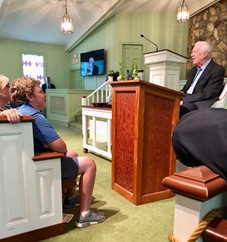The Disappearance of the Junior Paper

December 12, 2017
Molly Briggs ’19, News Editor
What assignment causes the most late nights, the most frantic research, the most anxiety, stress, and worry, and causes anyone who hears its name to be filled with dread? That’s right: the famous junior paper, which has, as of this year, been taken away. But why?
The history department has made this decision because they believe that while the junior paper allows students to develop important skills, it isn’t necessary for the AP curriculum. Dr. Tyrrell, teacher of AP U.S. History, says the paper is really an addition to the AP course, and the class is already demanding enough. Juniors have to read a chapter a week and write a two-page paper twice a month as it is. The whole of junior year is very stressful, and the paper seems to add an immense amount of anxiety, and because of how much juniors have to do, the papers had always been almost universally of lower quality. Traditionally, the junior paper would be completed over the course of the entire year, but many busy students would let the work go until the last minute, not allowing them to effectively learn the skills that are its purpose. According to Mr. Black, head of the history department, when the junior paper was in its “hay-day,” there was no AP U.S. History. But now the demands of the AP curriculum “make it very difficult to take the time that would result in a valuable junior paper as it was envisioned in the beginning.”
But the history department believes that improving research skills and writing could still be achieved with smaller, more manageable assignments. The junior paper is now divided up into parts that are integrated into the AP curriculum, allowing juniors to understand how to write a better research paper. These smaller research opportunities allow students to practice and master the same skills as the junior paper, but also reinforced the learning needed to prepare for the AP. However, the history department believes that the idea of the junior paper is still valuable, just not during the stressful and work-loaded junior year. Instead, they are in the process of the discussion of the possibility of having a semester of senior year devoted to research and writing. Seniors would have to do the paper in this course, but the entirety of the course would be based on the paper. While this still may seem daunting, the course would be designed so the students would be doing the work in class instead of mostly on their own, allowing their research to be guided and not overloading them with work. This way, students can develop their research and writing skills and still be able to write about something that they’re interested in, but with less work and more advising. As Dr. Tyrrell says, “Senior year, the curriculum could benefit from an independent course of study so seniors could have time to dive into topics of choosing and take more ownership in learning.” Mrs. Luebbers agrees, saying “interest-based work in the classroom is great.” Ideally, the senior course would begin next year, but this idea is still in discussion, and it’s almost too soon to talk about. “The more we look into it the more there are obstacles,” Mr. Black claims. The question is, would seniors even be interested in this?
As a student who is part of the first junior class to try out these smaller papers, I agree with the history department that junior year is difficult, and that while I don’t have experience with the big junior paper, these smaller papers seem more manageable. And they actually have to do what we are learning, making it relevant to the class and helping us learn the material better. As for the senior year research course, it would allow seniors to be able to research about something that interests them like the junior paper, but there are still many more things that need to be discussed. Nellie Shih ’19 claims “My concern is how they would organize that class. I think it’s a good idea but how do you structure a class where everyone is research different topics in 47-minute intervals?” Sid Chandrasekar ’18, wrote the junior paper last year, believes the senior course “would be a lot less motivating” and that the paper was “really valuable junior year.” Also, seniors already have to write a five-page research paper for English: “It’s not as big a deal but it’s still there.” Evidently, the senior paper is still under construction (hopefully it’ll be done before the north campus project) and the smaller junior papers are still very new, so don’t get your hopes up (or don’t be too distraught) quite yet.













Aadhya • Dec 15, 2017 at 7:10 am
Insightful article!